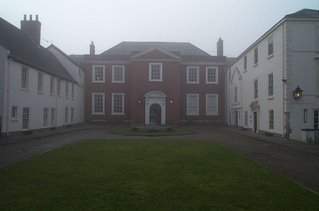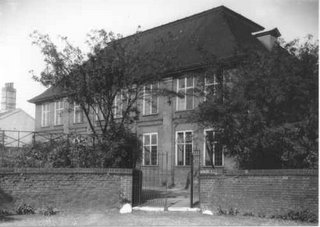Dr. John Alexander of Norwich: VIII.

Not only was John Alexander concerned with reaching the city of Norwich and its outlying settlements, founding Sunday Schools and chapels, but he encouraged an interest in foreign missions in his church. From the beginning of the church there were members who contributed to foreign missions, and in 1833 the Princes Street Auxiliary of the Norfolk Missionary Association was formed. Often meetings of the Norfolk Missionary Association were held in the chapel. A huge platform would be set up for the representatives, level with the pulpit. Missionary breakfasts were held in the Assembly House (illustrated).
Although taking the Gospel to the heathen in lands where it was still unknown was a priority, as migration to the colonies increased it became clear that there were white settlers who were as much without God as the natives whose lands some of them were taking. Men and women leaving England were also leaving Christianity. Alexander took great interest in colonial missions, and when he was chairman of the Congregational Union in 1853 he made a special plea for this work, as the tide of emigration had swelled to thousands leaving every week.
And Mr. Alexander did not confine himself to his own church's activities, vast though they were. He took an interest in the life of the city, especially in religious, philanthropic and educatonal movements. We must remember that this was before state provision of education, and no-one at that time could even have imagined a National Health service. Alexander was for a time chairman of the board of the Norfolk and Norwich Hospital.
Norwich Dissent grew in influence in the 19th century. Buildings like the Old Meeting House, the Octagon Chapel and the old Gildencroft Quaker meeting-house (illustrated. Sadly destroyed by bombing in WWII. Some Quakers felt the Germans hit the wrong meeting-house) show that it had been wealthy before, but never to the extent it was to become.
 Alexander's unflagging efforts for his church and the wider church and community earned him a respect unusual for dissenting ministers in the period. One day he might be dining with the Bishop at the Palace, the next with the Quaker bankers, the Gurneys. And yet the man who was to be seen among the great and the good would also be seen without fail visiting the destitute and the bereaved.
Alexander's unflagging efforts for his church and the wider church and community earned him a respect unusual for dissenting ministers in the period. One day he might be dining with the Bishop at the Palace, the next with the Quaker bankers, the Gurneys. And yet the man who was to be seen among the great and the good would also be seen without fail visiting the destitute and the bereaved.Among these great and good, of course, were many philanthropists, such as Sir Thomas Fowell Buxton, Bart., the anti-slavery campaigner whose crusade against slavery was enthusiastically supported by Alexander and his congregation. The Quaker Gurneys were also great philanthropists, so we ought not to think that Alexander was just hob-nobbing with the wealthy - he was helping them in schemes to improve the city, the country, and the world.
Alexander also kept up good relations with the other ministers of the city. Mention has already been made of his dining with the Bishop, Bishop Stanley, who admired the congregational pastor's energy (inherited, one suspects, from his father), but he was also on good terms with Joseph Kinghorn, the Strict Baptist pastor of St. Mary's, whom he called, "A wise counsellor, a holy example and a faithful friend."
Kinghorm's successor, William Brock, was also a friend of Mr. Alexander's, and unlike Kinghorn was willing to admit Alexander to the Lord's Table. Indeed, there was a period when Willian Brock, John Alexander, and Andrew Reed, pastor of the Old Meeting, lived within a few doors of each other, and the three ministers would always be calling on each other. Those were great days for Norwich dissent. The three ministers all held to the same creed, barring differences concerning baptism, and there was a true fellowship between them. By this time Alexander was growing older, and the two younger pastors looked up to him as he had looked up to Kinghorn.
So he moved from being the new pastor to being the old prophet of Norwich dissent. God willing next time we shall consider some of the events of his later years.
Labels: John Alexander

0 Comments:
Post a Comment
<< Home